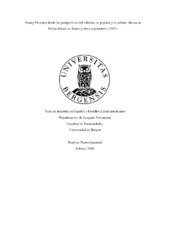Nancy Morejón desde las perspectivas del folklore, lo popular y la cultura clásica en Richard trajo su flauta y otros argumentos (1967).
| dc.contributor.author | Quansah, Naana Beatrice | |
| dc.date.accessioned | 2018-02-19T08:34:42Z | |
| dc.date.available | 2018-02-19T08:34:42Z | |
| dc.date.issued | 2018-02-16 | |
| dc.date.submitted | 2018-02-15T23:00:04Z | |
| dc.identifier.uri | https://hdl.handle.net/1956/17410 | |
| dc.description.abstract | This thesis explores Nancy Morejón’s Richard trajo su flauta y otros argumentos, a collection of poetry published in 1967, only a few years after the triumph of the Cuban Revolution (1959). Drawing from textual references to the poet´s biographical data as well as allusions made to certain key events in Cuba´s history, the study looks at how various cultures especially; European, African as well as Chinese cultures have come together to build the nation´s identity through the process of Transculturation. It also brings to the limelight prevailing social situations with regards to religious practices, race, gender and social equality which have been prevailing issues in Cuba during the 20th Century, although not exclusively limited to this period. Through the concepts; folklore, popular music and transculturation, this thesis spells out how the poet, as a voice of the people, employs the aesthetics of poetry to depict and react to these socio – cultural as well as political situations. | en_US |
| dc.language.iso | spa | eng |
| dc.publisher | The University of Bergen | eng |
| dc.subject | the Afro-Cuban woman | eng |
| dc.subject | Transculturation | eng |
| dc.subject | Folklore | eng |
| dc.subject | Kolonialisme | eng |
| dc.subject | Kuba | eng |
| dc.subject | Lyrikk | eng |
| dc.subject | Slaveri | eng |
| dc.subject | Imperialisme | eng |
| dc.subject | Populærmusikk | eng |
| dc.title | Nancy Morejón desde las perspectivas del folklore, lo popular y la cultura clásica en Richard trajo su flauta y otros argumentos (1967). | eng |
| dc.type | Master thesis | |
| dc.date.updated | 2018-02-15T23:00:04Z | |
| dc.rights.holder | Copyright the author. All rights reserved | eng |
| dc.description.degree | Spanish Language and Latin-American Studies - Master's Thesis | |
| dc.description.localcode | SPLA350 | |
| dc.subject.nus | 711128 | eng |
| fs.subjectcode | SPLA350 | |
| fs.unitcode | 11-20-00 |
